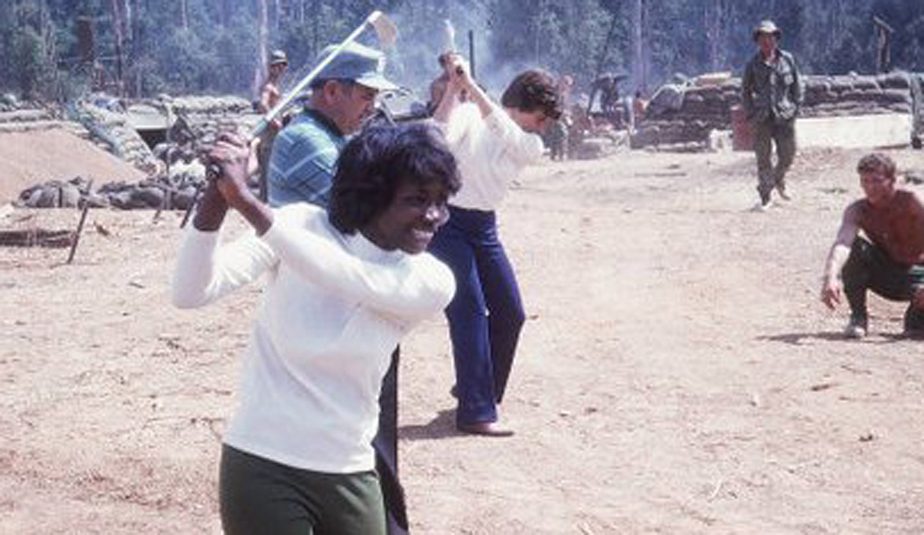Editor’s note: In the global golfing community, Renee Powell is a well-known pioneer and advocate for the game and inclusion. Her hard work continues to be honored, with the Charlie Bartlett Award (presented in April at the Masters any other year) being the latest recognition for her “unselfish contributions to the betterment of society.” This is the second in a three-part series on Powell and her efforts to continue the legacy of her family.
Even after all these years, Renee Powell can get downright poetic when she walks outside and looks around the golf course that is her front, back and side yard.
“I love nature,” she says in the company of a visitor. “Man didn’t make that tree. Man didn’t make that sky. Look at the changing of the leaves.
“The sun’s staying up, and it’s not falling down on us. The moon’s not going to fall down on us. There’s a higher power than any of … us.”
She worries about the world, and the country.
“Sometimes I almost think we live in an atheistic country,” she said, before catching herself.
“You have to be optimistic,” she went on. “You have to keep hope or people just shrivel up and die. Because there are many more good people in the world than bad people. There are more people also who understand that God is still in control.”
Powell counts herself fortunate to have grown up with parents who were strong role models.
“My mom was really nice and really calm,” she says. “My dad was … tough . My parents were strict. I was glad they were because after I got out in the world, their example always turned negatives into positives.”
Always, there was golf at Clearview, the course her father began building the year she was born. Bill Powell taught her the game, true, but with a course to run, he left Renee on the course on her own for countless hours.
She was an experienced player by the time she was in grade school. She attended East Canton schools for three years. She was the only Black girl in her classroom, which, in the 1950s, entailed a subset of issues.
Facing racism as a girl
“I had so many problems with students and teachers because I was the only one in my class that looked like me,” she said. “It was third grade when everything happened. I was 8 years old. Do you remember being 8?
“My first friends said they couldn’t play with me because I was colored. One time a boy was chasing me on the playground with a knife, so I ran inside. The teacher said, ‘Nobody’s chasing you.’ She put her hands on my shoulders and marched me out to the school door. She sent me out, and locked the door. I remember just standing there on the steps. I didn’t want to go back on the playground.
“It got to be incident after incident after incident. I came home crying all the time. My parents had to go up to the school to try to handle things. So my parents took me out of here and enrolled me in St. Benedict’s. ”
She enrolled at St. Benedict’s in Canton for fourth grade, shortly after Rosa Parks famously refused to give up a bus seat in Alabama.
“It might have been fifth grade when our bus driver picked me up to go to St. Benedict’s and told me to go to the back of the bus,” Powell said. “I was in a seat and said, ‘I’m not gonna move.’ He said, ‘The bus isn’t gonna go until you go to the back of the bus.’ And all the kids started laughing at me.
“I knew not to go to the back of the bus. I went to the middle of the bus and sat there. I didn’t get angry. It was insulting. I knew what the driver said wasn’t right, and I knew when the kids started laughing, that wasn’t right. I mean, you know right from wrong, right?
“I came home and told my mom what happened and she called the priest … and the priest hung up the phone.
“My dad wasn’t Catholic. He was Methodist. He was on the course, all muddy from working, when he was told about it. He got me in the car and and drove to see the priest. They had a nice gentleman’s discussion.
“After that, the priest had respect for my dad and for my mom.”
Another incident during the St. Benedict’s days sticks with her.
“There were twins,” she said. “One of them called me the ‘n’ word, and I stood there and went … shoom … slapped him across the face.
“The next day I was at school again, and I thought about it, and when I saw him again, I went … wham … and I slapped him again. He never said anything about it. And he never called me that again.
“It wasn’t like I got angry. It was more along the lines of, I can’t believe he said that.”
She spent her high school years at Canton Central Catholic, before there was a St. Thomas Aquinas, which became her brother Larry’s high school. One bus took Renee from East Canton to St. Benedict’s, and from there to St. Anthony’s, where a different bus carried students to the high school.
What was the Black population at Central Catholic in the early 1960s?
“There was Alan and his brother, Howard … Howard came by three years ago … it was the first time I had seen him since high school. Then when you went in the main door at Central Catholic, the boys went that way, and the girls went that way, so you never saw the boys. There was one girl who was a senior when I was a freshman, and what was a senior going to say to a freshman? And then there was me. So that was the Black population of our school.”
Alan and Howard were the Page brothers. Alan Page, a year older than Renee, became a Pro Football Hall of Fame defensive lineman and then a justice on the Minnesota Supreme Court.
Recently, Clearview had visitors from up Alan Page’s way.
“There were two guys from Minneapolis in their 20s,” she said. “They were interested in history and the contributions Black people have made to the game of golf and the world in general. It was a like a pilgrimage.
“The one guy was celebrating his 24th birthday. They came out and played three days in a row. They were funny. They said, ‘What’s it feel like to be a legend?’”
Golf prodigy
Two figures stand out as the best junior girls golfers to come through Stark County.
One is Massillon’s Eva Shorb, who would marry a man named Tom Weiskopf, with whom she had a son who grew up to win the 1973 British Open. The other is Renee Powell.
Renee became unbeatable in local and regional youth golf tournaments, some of which her parents had to fight to get her entered. She was between her sophomore and junior years at Central Catholic when she became the first African-American to play in the U.S. Girls’ Junior Championship.
“It was my first big tournament,” she said. “I was 16. Back then, when you read the write-ups, I was a referred to as ‘Renee Powell, a Negro from Ohio.’
“The tournament was at the Country Club of Buffalo. There were like four Rolls Royces sitting outside the clubhouse. I was like, wow.
“Joe Dey was the director of the USGA then, before he was the first commissioner of the PGA Tour. I remember he was so nice. They came out to greet my dad and me, and he said, ‘We want to welcome you, Mr. Powell, and we want to let you know that the only thing the USGA requires is that you have a golf game … and Renee has that.”
Dey’s words hit Bill Powell where he lived. Half of what Bill loved about golf was that the scorecard didn’t lie, and it was colorblind.
Renee lost in the quarterfinals. Mary Lou Crocker, who became a friend for life, won the tournament. Powell and Crocker played on the LPGA together for more than 10 years. They were part of a USO group that flew to Saigon to help entertain U.S. troops during the Vietnam War.
In later years, Crocker would come up from Texas with a carload of golf gear and help Powell with her junior program at Clearview. When Crocker died in 2016, the obituary requested that in lieu of flowers contributions be made to Clearview Hope Veterans, whose mission simply is to give those who served a haven to play golf.
Off to college
After Central Catholic, Renee enrolled at Ohio University. She became captain of the women’s golf team and helped the golf coach teach classes. She transferred to Ohio State and became a golf captain there.
She has lived a lifetime knowing the phrase “first African American to …”
That applies to being the first to captain a golf team at a major university.
She enjoyed the part of campus life that was merely about being a college girl.
“Nancy Popa and I were on the team together when Ed Sneed was on the men’s team,” she said. “Nancy would say, ‘I’m gonna marry that guy,’ and she did … and they’re still married.”
Ohio State fought for her in an issue pertaining to the Ohio Golf Association state tournament. For that, she remains grateful.
“I was the best female amateur golfer in the state, but I never played in that tournament,” she said. “The reason was that they played at events where Black people were not allowed to play.”
Ohio State, a member of and substantial donor to the the state association, informed officials the relationship would end if Powell’s application to the state tournament was not accepted,
“I’m thinking, wow, this university with 40,000 students is taking a stand for one individual,” she said.
Life on the LPGA Tour
Powell qualified for the U.S. Women’s Open while in college and before joining the LPGA Tour in 1967. She became the second African-American on the Tour, following Althea Gibson, who had been a major tennis star before turning to pro golf in 1964, at age 36.
Many of the players on Tour knew Powell, or knew of her, from her successes as an amateur.
“The problems came from outsiders,” Powell said. “The ’60s were a turbulent time. We played in places in the deep South where there were many challenges, but it wasn’t only in the South. There were plenty of places elsewhere in the country where I wasn’t welcome as a Black woman in golf. There were always people who welcomed me with open arms, too.”
Powell played on the Tour for 13 years. The early years were the most trying in terms of prejudice.
“Sandra Post and I roomed together a lot,” she said. “We’d be in restaurants and people didn’t want to serve us because I was there. Reservations were lost at hotels. I’d be stopped on the way into locker rooms, even though I had the same credentials. There were the threats on my life … for playing on my Tour in my country.
“I ran into a lot of racism because it was the ’60s and there was so much going on. These were times when Black people were still being lynched. I was traveling throughout the South, to Selma, Alabama, and Vicksburg, Mississippi, getting obscene phone calls to my hotel room and things that my white colleagues were not running into.
“Nothing like that had ever happened to me before. It dawned on you that people have good access to us on a course. They walked down fairways with us. It played on your mind.”
Kathy Whitworth, who won 88 times on the LPGA Tour, became an ally. One time while trying to check into a hotel during a Tour stop in Idaho, Powell was told no reservation could be found.
Whitworth guessed what was happening and told hotel management, “Either we all stay, or we all walk.”
A room key appeared.
Powell said she took her time on Tour as a job, not a crusade, but often enough, one of her fellow pros would ask about the Black experience on a predominately white tour. Hall of Famer Carol Mann, who won 38 times on Tour, was among the curious.
“Carol Mann always got deep,” Powell said. “I would say, ‘OK, this is my world, Carol. Almost everywhere I go, I’m the only Black person. So let’s change roles. Imagine you were the only white person and everyplace you go it’s only Black people. A tournament. A banquet. Wherever. Imagine that and you can answer your own question.”
The worst of being a Black player in that era was death threats. More common were such things as a spectator jingling change in a pocket while she putted.
Powell was competitive on Tour but not spectacular. Twice she tied for 20th in the LPGA Championship. She won a tournament in Australia. She placed fourth on a states-side tournament.
Staying out there was expensive. In terms of peace, love and fun, this wasn’t like knocking the ball around at Clearview while daddy mowed a green.
“We always talk about how golf is such great therapy,” she said. “Great therapy … unless you play it for a living.”
She moved to England for a while while picking her spots with a Tour schedule. She found a job overseas as a pro at a private club. She designed clothes and wrote for a golf magazine.
In 1996, she came home to Clearview. And that is where you will find her in 2020, and where her heart will always be.
The article "Renee Powell talks childhood, early golf success, playing on LPGA Tour" was originally published on https://golfweek.usatoday.com/2020/11/09/renee-powell-talks-childhood-early-golf-success-playing-on-lpga-tour/




